|
|
|
Sort Order |
|
|
|
Items / Page
|
|
|
|
|
|
|
| Srl | Item |
| 1 |
ID:
092140
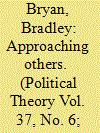

|
|
|
|
|
| Publication |
2009.
|
| Summary/Abstract |
The essay sheds light on Aristotle's understanding of friendship and its relation to political life.The author challenges the usual view that Aristotle postulates three distinct kinds of friendship. Instead the author argues that Aristotle understood there to be only one kind of friendship, and that other "friendships" were to Aristotle "unfinished" and thus not friendship at all. Aristotle shows that the relation between friendship and politics is grounded in friendship's possibility for human beings, and not as something cherished for its actuality. By looking at proper friendship as possibility and not actuality, we could only ever interpret the infamous statement attributed to Aristotle-"my friends, there are no friends"-not as illuminating of what friendship is but rather as a nostalgic diagnosis of the decay of the possibility of friendship, and hence of politics. By extension, and more poignantly, interpreting Aristotle's work on friendship in this light, we stand ready to reinterpret the mobilization of Aristotelian friendship for contemporary understandings of democratic practice.
|
|
|
|
|
|
|
|
|
|
|
|
|
|
|
|
| 2 |
ID:
100676
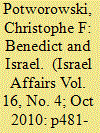

|
|
|
|
|
| Publication |
2010.
|
| Summary/Abstract |
The article explores the possibilities of friendship between Israel and the Pope in the light of Pope Benedict's denial of a reduction of religions to cultural artefacts and his commitment to religious claims to truth. Any discussion of Benedict XVI and Israel must take into account this call for the respect of the human desire for truth, the confidence in the ability of reason, and the validity of religious statements. This article offers some reflections on Benedict XVI's contribution to the larger debate of interreligious dialogue between Christianity and the Jewish faith. After a brief look at Vatican II's Nostra Aetate and at John Paul II, the essay examines some sections of Benedict XVI's Jesus of Nazareth and his first encyclical Deus Caritas est with a view of developing the category of friendship as it applies to his attitude to the faith of Israel.
|
|
|
|
|
|
|
|
|
|
|
|
|
|
|
|
| 3 |
ID:
147696
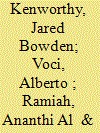

|
|
|
|
|
| Summary/Abstract |
Across one longitudinal and two cross-sectional surveys in Northern Ireland, we tested a model of intergroup relations in which out-group attitudes and behavioral tendencies are predicted by cross-group friendship and positive intergroup appraisals, mediated by intergroup emotions and out-group trust. In study 1, out-group friendship at time 1 predicted out-group trust at time 2 (one year later), controlling for prior out-group trust. In study 2, positive and negative intergroup emotions mediated the effects of friendship on positive and negative behavioral tendencies and attitudes. In study 3, a confirmatory factor analysis indicated that trust and emotions are distinct constructs with unique predictive contributions. We then tested a model in which cross-group friendship predicted intergroup emotions and trust through intimate self-disclosure in out-group friendships. Our findings support an integration of an intergroup emotions framework with research highlighting the importance of cross-group friendship in fostering positive intergroup outcomes.
|
|
|
|
|
|
|
|
|
|
|
|
|
|
|
|
| 4 |
ID:
140458
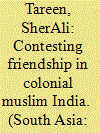

|
|
|
|
|
| Summary/Abstract |
This essay examines competing understandings of ideal publics in modern South Asian Islam by analysing a polemical debate among Muslim scholars about the boundaries of friendship between Muslims and non-Muslims. The specific context of this polemic was the pan-Islamic Khilafat movement and concomitant debates on the limits of friendship between Muslims, the British and Hindus. Through a close reading of this polemic, I show ways in which Muslim normative sources are mobilised and interpreted for radically contrasting ideological and political projects. The specific focus of this essay is on intra-Muslim contestations surrounding the category of muwalat (friendship or clientage), and it shows the opposing ways in which this category was approached by Indian Muslim scholars as either friendship between different religious communities or in terms of a citizen's relationship to a modern state. These varied understandings of muwalat, I argue, corresponded to diverging imaginaries of a moral public. This essay particularly focuses on the thoughts of the towering Indian Muslim scholars, Ahmad Raza Khan (d. 1921) and Abul Kalam Azad (d. 1958).
|
|
|
|
|
|
|
|
|
|
|
|
|
|
|
|
| 5 |
ID:
171129


|
|
|
|
|
| Summary/Abstract |
Based on ethnographic fieldwork in China and Georgia, this article traces the origins and describes current practices of post-Soviet tourist trading in Yabaolu Market in Beijing. While traders from across the Caucasus visit Yabaolu, my focus is on Georgian traders who today perceive themselves as biznesmeny. Focusing on a typical trade visit, the article explores the role of ethnic and kinship ties in the organization of this trade. It questions the notion of ethnic entrepreneurship and the idea that ethnic cooperation itself may serve a basis of trust and underpin traders’ activities. Instead, the article illustrates how enduring transnational linkages are built on other forms of reliability and reputation. These are framed in the lexicon of friendship, as well as kinship and pseudo-kinship vocabulary, and facilitate commercial transactions between traders of different ethnic, social and religious backgrounds in an environment where state regulation and legal law enforcement are almost absent.
|
|
|
|
|
|
|
|
|
|
|
|
|
|
|
|
| 6 |
ID:
178179
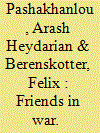

|
|
|
|
|
| Summary/Abstract |
This article scrutinizes the assumption that friends support each other in times of war. Picking up the notion that solidarity, or ‘other-help’, is a key feature of friendship between states, the article explores how states behave when a friend is attacked by an overwhelming enemy. It directs attention to the trade-off between solidarity and self-help that governments face in such a situation and makes the novel argument that the decision about whether and how to support the friend is significantly influenced by assessments of the distribution of material capabilities and the relationship the state has with the aggressor. This proposition is supported empirically in an examination of Sweden’s response to its Nordic friends’ need for help during the Second World War – to Finland during the 1939–1940 ‘Winter War’ with the Soviet Union, and to Norway following the invasion of Germany from 1940 to 1945.
|
|
|
|
|
|
|
|
|
|
|
|
|
|
|
|
| 7 |
ID:
101834
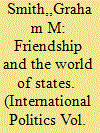

|
|
|
|
|
| Publication |
2011.
|
| Summary/Abstract |
What contribution can a theorization of friendship offer to the understanding of the world of states? It is argued here that the contemporary view of friendship eclipses a longer and broader appreciation. As such, the view of friendship that identifies it as affective, private and particular (here termed the contemporary-affective view) is one instance of a much wider cluster of ideas sharing overlapping characteristics. So conceptualized, 'friendship' is the concern with what binds person-to-person. It is a concern with the nature and fabric of the political. Seen from this vantage point, friendship highlights what an analysis through the state tends to overshadow: the enduring affinities, identifications and bonds that permeate the dynamics of the world of states. Thus, friendship need not remain the preserve of the premodern (Aristotle), nor be usurped as an adjunct to sovereignty and power (Schmitt), but investigated as an ongoing site of analysis for phenomena within, between and beyond states.
|
|
|
|
|
|
|
|
|
|
|
|
|
|
|
|
| 8 |
ID:
073754
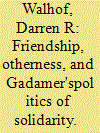

|
|
|
|
|
| Publication |
2006.
|
| Summary/Abstract |
This article makes the political dimension of Gadamer's thought more explicit by examining the interplay of three concepts in his work: solidarity, friendship, and the other. Focusing primarily on certain post-Truth and Method writings, I argue that Gadamer's conception of solidarity has to do with historically contingent manifestations of bonds that reflect a civic life together of reciprocal co-perception. These bonds go beyond conscious recognition of observable similarities and differences and emerge from encounters among those who are, and remain, in important ways other to each other. I make this case through an analysis of Gadamer's phenomenology of friendship and the crucial role of otherness in his accounts of both understanding and friendship. I suggest that Gadamer's political thought gives us a way of conceptualizing solidarity and otherness without making the other same or leaving the other completely other.
|
|
|
|
|
|
|
|
|
|
|
|
|
|
|
|
| 9 |
ID:
101839
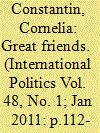

|
|
|
|
|
| Publication |
2011.
|
| Summary/Abstract |
This article highlights the uses of friendship by associations that perpetuate the memory of the Fathers of Europe. It demonstrates that the invention of the tradition of the 'Fathers of Europe' is not the monopoly of European institutions. It was made possible by the mobilization of associations of heirs that have perpetuated these Fathers' memory since the 1960s. From a social history perspective, the article analyzes some case studies that show how associations of friends devoted to the Fathers of Europe have been created, and what kind of activities they have led throughout time. International friendship emerges as a set of reconstructed memories through the practices of the transnational spheres, by transforming a dead friend into an exemplary friend in order to legitimize a certain vision of the European past.
|
|
|
|
|
|
|
|
|
|
|
|
|
|
|
|
| 10 |
ID:
101836
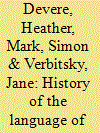

|
|
|
|
|
| Publication |
2011.
|
| Summary/Abstract |
While the concept of friendship has been largely invisible within Western political debate, in the international political domain, 'friendship' and the language of friends have been prominent in treaties and alliances between nations. Database searches on the topic of 'politics and friendship' locate predominantly references concerning relationships between states. However, it has been war and enmity rather than friendship that has dominated analysis in international relations literature. In this article we provide a history of international treaties, focusing in particular on those named as friendship treaties. We will discuss the use of concepts and terminology related to friendship and the nomenclature associated with international alliances. It will be argued that friendship is more a tool of public relations and spin, rather than diplomacy and peace-building, and the cynical use of friendship does not sit easily with the Nehruvian concept of friendship as an important method of diplomacy that can act as a path to peace, goodwill and understanding between states and nations.
|
|
|
|
|
|
|
|
|
|
|
|
|
|
|
|
| 11 |
ID:
170630
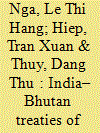

|
|
|
|
|
| Summary/Abstract |
This article is an attempt to relook at the treaties of 1949 and 2007 between India and Bhutan and argues that the 2007 Treaty is the outcome of the evolution and maturity of Bhutan as an independent and sovereign state, that it is imperative for India to make constant adjustments in its foreign policy towards Bhutan to secure its influence in the tiny but important country and maintain the strength of India–Bhutan bilateral relations. From the side of Bhutan, it is also important to have an ‘alliance shelter’, and India is best suited to meeting Bhutan’s needs for political, economic, societal and strategic shelter.1 By using a historical approach, this article shows why it was necessary for the two countries to renew the 1949 Treaty in the first decade of the twenty-first century. The article uses historical methodology, in combination with interdisciplinary methods such as comparative analysis, generalisation, and expert interviews. Major sources for the paper include the texts of the Treaties, speeches by political leaders and published articles and books by international writers, including writers from India, Bhutan and Vietnam.
|
|
|
|
|
|
|
|
|
|
|
|
|
|
|
|
| 12 |
ID:
177943
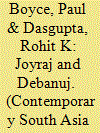

|
|
|
|
|
| Summary/Abstract |
In this article we want to evoke two characters that each suggest different points of departure for thinking about Kolkata as a queer kind of space. By this we want to evoke something of the sexual geography and life-ways of the city, but to go beyond this standpoint too, to question ways in which ethnographic characters might be evoked in respect of any context, Kolkata or elsewhere. In one sense this is to open out a perception of Kolkata as a scene of many sexual life-worlds, inviting a plural kind of analysis suggestive of a multiplicity of perspectives; persons/subjects each with a unique viewpoint to be captured. The two characters we explore here each draw attention to issues of belonging and migration, of both wanting to move to and away from Kolkata; creating new life-worlds via the city amidst its shifting sexual geographies, class and caste divisions, and wider diasporic connections and fault-lines. Kolkata itself emerges as an attribute of the characterisations to hand: sometimes as distinct mise-en-scene, at others a kind of sensibility or resonance field for understanding self and others.
|
|
|
|
|
|
|
|
|
|
|
|
|
|
|
|
| 13 |
ID:
158441
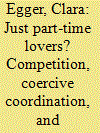

|
|
|
|
|
| Summary/Abstract |
This article starts from the premise that, due to a lack of dedicated incentives as well as the size of the population, International Non-Governmental Oragnzations (INGOs) are more likely to compete than to cooperate. Drawing upon collective action and principal-agent theories, this research provides a field-level perspective on INGOs’ cooperative strategies. Building on an analysis of two very diverse cases (human rights protection in Kosovo and humanitarian activities in Somalia), data collected through field research have led to a distinction between coordination, which depends on the provision of incentives and constraints by donors, and cooperation, which relies on trust and on pursuing common interests among INGO members. Overall, it appears that INGOs pursue a creative mix of strategies: competition, formal coercive coordination and informal trust-based cooperation. This paper concludes with a discussion of the results through the insights they provide on issues related to the fragmentation, efficiency and inclusiveness of the crisis response.
|
|
|
|
|
|
|
|
|
|
|
|
|
|
|
|
| 14 |
ID:
126038
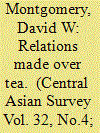

|
|
|
|
|
| Publication |
2013.
|
| Summary/Abstract |
Narratives of hardship and suffering found in portrayals of life in Central Asia elicit policy responses that attempt to remedy the situation through humanitarian or development interventions intended to enhance local well-being. This framing obfuscates a network of relationships and interactions that are instrumental in the making of meaningful lives in Central Asia. I explore the comfort of family and friends, the hope of possibility (real and imagined), and the happiness (even if fleeting) in the sharing of stories. Furthermore, even in the most trying of times, the communal sense that emerges in sharing concerns helps mitigate the stresses and strains of many social situations. Seeing these relationships as moments of well-being is essential to understanding everyday life and contextualizing hardship and suffering, and thus to conveying a fuller sense of what is understood as 'a meaningful life' in Central Asia.
|
|
|
|
|
|
|
|
|
|
|
|
|
|
|
|
| 15 |
ID:
144362
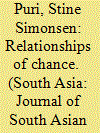

|
|
|
|
|
| Summary/Abstract |
This paper examines male friendship at the Delhi racecourse as an example of a sociality amidst an urban South Asian setting defined by uncertainty and the absence of fixed identities. It argues that such friendships are ‘relationships of chance’, embodying and reflecting the contingency of the gambling arena, rather than sociological or ritual notions which may condition friendship in other settings. This hyper-competitive and hyper-social space configures both the possibility and impossibility of friendship. The paper thus provides insights into how relating to others happens in a heterogeneous, fluid context that is over-determined mainly by a shared passion for self-enrichment.
|
|
|
|
|
|
|
|
|
|
|
|
|
|
|
|
| 16 |
ID:
159312
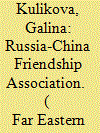

|
|
|
|
|
| Summary/Abstract |
This article describes the Russia-China Friendship Association (RCFA), which continues the traditions of the country's first friendship society with peoples of foreign countries - the Sino-Soviet Friendship Society (SSFA) set up in Moscow on October 29, 1957, which has worked for sixty years uninterruptedly for the sake of strengthening mutual understanding and friendly ties with our neighbor China and the great Chinese people.
|
|
|
|
|
|
|
|
|
|
|
|
|
|
|
|
| 17 |
ID:
170756
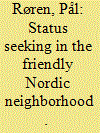

|
|
|
|
|
| Summary/Abstract |
The article argues that the way status is pursued in social groups in world politics is contingent on the type of social relations that constitute interaction between the members. The Nordic region is a group of countries marked by friendship and trust. Here, the numerous societal linkages between the Nordic countries have made their region into a ‘friendly neighborhood’. This has changed the way that these countries pursue status. To explore this status dynamic, the article draws on a series of interviews with Nordic diplomats and argues that a strong friendship both enables collective status seeking, and constrains individual status seeking. Specifically, turning their social group into a friendly neighborhood allows the Nordic countries to posture as a collective polity and seek status on behalf of it. This grants them more status recognition in world politics. Moreover, friendship does not eliminate status rivalry, but it does turn it into a friendly kind of status competition. Indeed, while the intra-regional intensity of the competition endures, the article finds that the Nordic countries are unlikely to compete in ways that might harm their friendship or their neighborhood.
|
|
|
|
|
|
|
|
|
|
|
|
|
|
|
|
| 18 |
ID:
080670
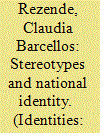

|
|
|
|
|
| Publication |
2008.
|
| Summary/Abstract |
In this article, I examine how stereotypes are deployed in the process of experiencing national identities. Specifically, I analyse how a group of Brazilian academics who have studied in Europe and the United States have dealt with stereotypical notions of Brazilians as "warm people" who establish friendship "easily." Ideas about a "greater emotionality," which were often seen as negative from a European colonial perspective, are embraced and re-signified by them as a positive feature of Brazilian national identity, particularly when compared to the supposed "closed nature" of some Europeans. I argue therefore that the presence of such stereotypes contributes to reinforce a subjective sense of Brazilianess and also reveals the negotiations of power relations in the process of elaborating Brazilian national identity
|
|
|
|
|
|
|
|
|
|
|
|
|
|
|
|
| 19 |
ID:
101838


|
|
|
|
|
| Publication |
2011.
|
| Summary/Abstract |
Since the end of World War II, relations between Canadian and US leaders have become difficult, as the absence of the unifying force of war led to different political visions. However, on the whole, and in spite of a power differential that has grown since 1945, relations between Canada and the United States have nevertheless been good. How is this explained? In this reflection, rather than taking a structural-realist approach, we build on a perspective proposed by Stéphane Roussel in his theory on democratic peace between Canada and the United States. Roussel showed how the constructivist model could justify the absence of coercion and the relatively egalitarian cooperation between both states. While Roussel's studies refer only to the 1867-1958 period, we broaden the perspective to include the contemporary period and propose that the 'unsocial sociability' at the heart of Canadian-American relations is due to the recognition of the democratic nature of the other's regime and the implementation of institutional mechanisms and techniques.
|
|
|
|
|
|
|
|
|
|
|
|
|
|
|
|
|
|
|
|
|